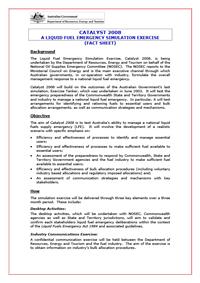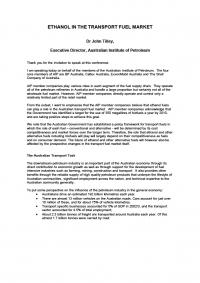Resources
Date
Description
Australian refineries continue to operate with no indications of any plans to close the remaining four There have been statements and Inquiry submissions from all refining companies about their future refinery investment plans and the ongoing role of these facilities in meeting customer…Date
Description
Self-sufficiency in transport fuels is not necessary for supply security Security of supply is the result of resilient and efficient supply chains and robust risk management – it is not about self-sufficiency or independence from markets. There are 3 critical elements of any strategy to…
Date
Description
In 2008, the Department of Resources, Energy and Tourism (DRET), on behalf of NOSEC, undertook a Liquid Fuel Emergency Simulation Exercise – 'Catalyst 2008'. The aim of 'Catalyst 2008' was to test the emergency preparedness of the Commonwealth State and Territory Governments and industry to manage…Date
Description
AIP member companies provide very reliable supplies of fuel to the Australian market and: represent around 90% of primary fuel supply to the Australian market, have decades of operational experience in Australia and Asia delivering high quality fuel to customers, have major…Date
Description
AIP has produced a set of basic facts on biofuels in Australia to inform consumers, commentators and other interested parties. AIP has consistently stated that there is a sustainable role for biofuels in the Australian fuels market provided biofuels are competitively priced, have a reliable supply…Date
Description
The Federal Government has introduced regulation of the quality of petrol and diesel fuel in Australia. The principal drivers of the fuel quality regulation are environmental. The adoption of emerging vehicle engine and emission control technologies is a key strategy in the management of ambient…Date
Description
The Australian Institute of Petroleum (AIP) in conjunction with petrol manufacturing and importing member companies have decided to remove dye from unleaded petrol and E10 (regular unleaded petrol with 10% ethanol added). This change will not have any impact on the fuel’s performance or on…Date
Description
The Australian Institute of Petroleum (AIP) advises that petrol manufacturing and importing member companies are currently in the process of changing the industry controlled standard colour (dye) of unleaded petrol (i.e. 91 Research Octane Number grade) from Purple/Bronze to Red/Orange. This colour…Date
Description
The Australian Institute of Petroleum (AIP) and its member companies welcome the introduction of legislation into the Australian Parliament by Ian Macfarlane, Minister for Industry, Tourism and Resources to implement retail petroleum market reform. The Australian petroleum market will continue…
Date
Description
Dr John Tilley, Executive Director of the Australian Institute of Petroleum, told the 2005 International Ethanol Conference in Brisbane today that AIP members see a role for ethanol as a fuel extender, replacing some fuel imports and helping to meet the growth in overall fuel demand, as well as a…